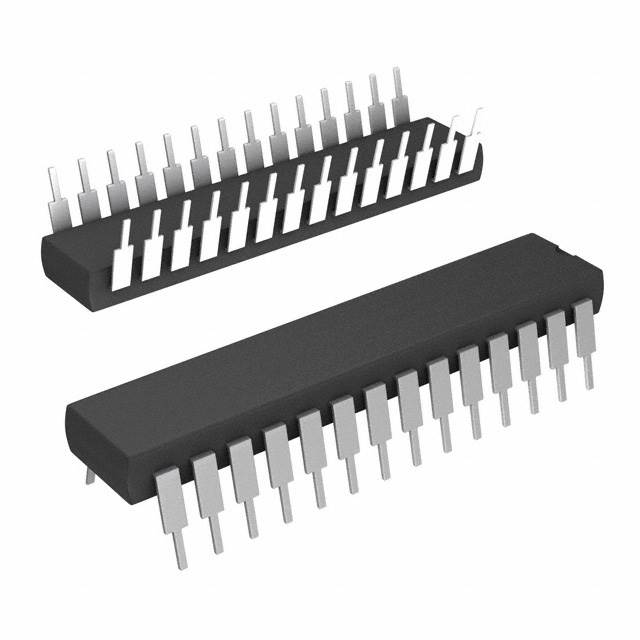ADG526AKN
Product Overview
Category: Integrated Circuit (IC)
Use: Analog Multiplexer/Demultiplexer
Characteristics: - High performance CMOS technology - Low power consumption - Wide operating voltage range - Fast switching speed - High input impedance - Break-before-make switching action
Package: DIP (Dual In-line Package)
Essence: ADG526AKN is a versatile analog multiplexer/demultiplexer IC that allows multiple analog signals to be routed to a single output or vice versa.
Packaging/Quantity: The ADG526AKN is available in a 16-pin DIP package. It is typically sold in quantities of one unit per package.
Specifications
- Supply Voltage Range: ±4.5V to ±18V
- On-Resistance: 45Ω (typical)
- Off-Leakage Current: 1nA (maximum)
- Channel-to-Channel Crosstalk: -90dB (typical)
- Operating Temperature Range: -40°C to +85°C
Pin Configuration
The ADG526AKN has a total of 16 pins, which are assigned as follows:
- IN1
- IN2
- IN3
- IN4
- IN5
- IN6
- IN7
- IN8
- VEE
- GND
- COM
- NO1
- NO2
- NO3
- NO4
- VDD
Functional Features
- 8-channel multiplexer/demultiplexer
- Bidirectional operation
- Break-before-make switching action ensures no short-circuits during switching
- Low on-resistance and high input impedance for minimal signal distortion
- Wide supply voltage range allows compatibility with various systems
Advantages and Disadvantages
Advantages: - Versatile analog signal routing capabilities - Low power consumption - Fast switching speed - High input impedance for minimal signal distortion - Wide operating voltage range for compatibility with different systems
Disadvantages: - Limited number of channels (8) - Break-before-make switching action may introduce slight delay in signal routing
Working Principles
The ADG526AKN operates based on CMOS technology. It consists of eight independent analog switches that can be controlled to connect or disconnect the input channels to the output channel. The break-before-make switching action ensures that there are no short-circuits during switching, preventing any potential damage to the IC or connected devices.
Detailed Application Field Plans
The ADG526AKN finds applications in various fields, including: 1. Audio and video signal routing in multimedia systems 2. Data acquisition systems 3. Test and measurement equipment 4. Communication systems 5. Industrial automation 6. Medical instrumentation 7. Automotive electronics
Alternative Models
Some alternative models to the ADG526AKN include: 1. CD4051B - 8-channel analog multiplexer/demultiplexer 2. MAX4617 - 8-channel SPST analog switch 3. DG408 - 8-channel analog multiplexer/demultiplexer 4. TS5A3359 - 8-channel bidirectional analog switch 5. MC14051B - 8-channel analog multiplexer/demultiplexer
These alternative models offer similar functionality and can be considered as substitutes depending on specific requirements.
Word count: 399
Lista 10 Vanliga frågor och svar relaterade till tillämpningen av ADG526AKN i tekniska lösningar
Sure! Here are 10 common questions and answers related to the application of ADG526AKN in technical solutions:
Q: What is ADG526AKN? A: ADG526AKN is a multiplexer/demultiplexer IC (Integrated Circuit) that allows for the selection of one input from multiple inputs or routing of one output to multiple outputs.
Q: What is the voltage range supported by ADG526AKN? A: ADG526AKN supports a wide voltage range, typically between -5V and +5V.
Q: How many channels does ADG526AKN have? A: ADG526AKN has 16 channels, which means it can handle up to 16 different inputs or outputs.
Q: Can ADG526AKN be used in both analog and digital applications? A: Yes, ADG526AKN can be used in both analog and digital applications, making it versatile for various technical solutions.
Q: What is the maximum frequency range supported by ADG526AKN? A: ADG526AKN can support frequencies up to several hundred megahertz (MHz), depending on the specific application and conditions.
Q: Is ADG526AKN suitable for high-speed data switching? A: Yes, ADG526AKN is designed to handle high-speed data switching, making it suitable for applications requiring fast signal routing.
Q: Does ADG526AKN require external power supply regulation? A: Yes, ADG526AKN requires an external power supply, typically within the range of ±5V to operate properly.
Q: Can ADG526AKN be cascaded to increase the number of channels? A: Yes, multiple ADG526AKN ICs can be cascaded together to increase the number of channels beyond 16.
Q: What is the typical on-resistance of ADG526AKN? A: The typical on-resistance of ADG526AKN is around a few ohms, which ensures minimal signal distortion during switching.
Q: Are there any specific precautions to consider when using ADG526AKN? A: Yes, it is important to ensure proper grounding and decoupling techniques while using ADG526AKN to minimize noise and interference in the circuit. Additionally, following the manufacturer's datasheet guidelines is crucial for optimal performance.
Please note that these answers are general and may vary depending on the specific application and requirements. It is always recommended to refer to the manufacturer's datasheet and consult with technical experts for accurate information.


